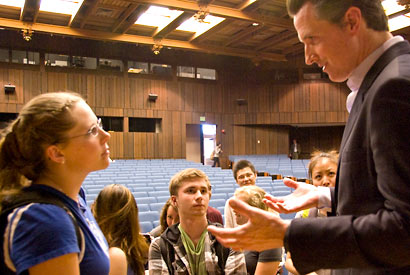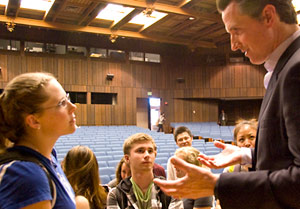Lt. Governor Newsom visits Bear territory
California Lieutenant Governor Gavin Newsom was the main event in Political Science 179, during a visit to the Berkeley campus March 30. The UC Regent and former San Francisco mayor also met with campus leaders on the impact of state funding cuts, visited CITRIS headquarters, and attended a student forum.

March 31, 2011
California Lieutenant Governor Gavin Newsom was the main event in Political Science 179, during his visit to the Berkeley campus Wednesday. Speaking to a packed audience in Wheeler Auditorium, the UC Regent and former San Francisco mayor said politics as we know it is broken because of politicians’ unwillingness to try new things, make mistakes, and risk losing their jobs.
“Too many politicians want to be something as opposed to do something,” he told students — in a talk that touched, as well, on meeting the challenges of climate change and on San Francisco’s sustainability accomplishments. Composting, he said to laughter, turned out to be more controversial than his opening the door on gay marriages.
Enthusiastic students crowded around Newsom afterward — to pose questions, mug for photos, even get him to autograph a ballot stub. Premed student Tina Scoggins, pictured here, dialogued with Newsom about healthcare reform.
Lecturer Alan Ross — who has taught Poli Sci 179 for 30 years — noted that students typically hightail it out of the auditorium at 5 p.m., when the class ends, but that dozens were still crowded around Newsom at 5:30, “hanging on his every word.”
The state official also visited California Hall, to discuss with Chancellor Birgeneau and Vice Chancellor Yeary how the campus is coping with state funding cuts. He rounded out the visit with a forum with students and a stop at Sutardja Dai Hall — headquarters of California’s multi-campus Center for Information Technology Research in the Interest of Society (CITRIS) — where graduate students described innovative IT-based research with potential to create jobs and address societal problems.
